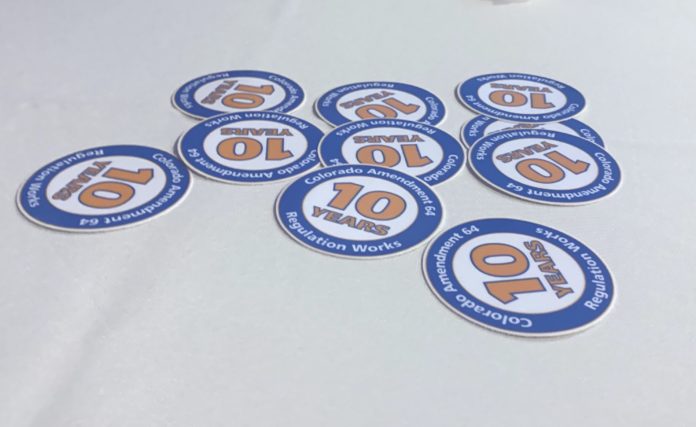
In July 2014, Colorado became the first government in the world to put regulated, legal marijuana on the shelves for consumers.
Legalization was thanks to a successful 2012 ballot initiative, Amendment 64, which garnered 55% of state voter support, drew a path for regulated use and made Colorado the unofficial stoner state of the U.S. Nearly 10 years after Amendment 64, adult-use marijuana legalization has expanded outside of Colorado.
Amendment 64 was historic not only for Colorado but for the rest of the world as 19 other states and multiple countries have since legalized adult-use marijuana. At an Oct. 11 event, lawyers, politicians and activists gathered to mark the 10-year anniversary of Amendment 64 and discuss the future of legalization.
The event was hosted by Vicente Sederberg LLP, a national marijuana law firm, and its public policy and consulting affiliate VS Strategies. The event was hosted at History Colorado and included a selection of photos and campaign materials from passing Amendment 64 that were donated to the museum for its archives.
Looking Back on Legalization
Vicente Sederberg LLP and VS Strategies were founded by some of the most pivotal figures in passing Amendment 64. Mason Tvert, a partner at VS Strategies, was the campaign co-director of Amendment 64 alongside Vicente Sederberg founding partner Brian Vicente.
According to Pew Research Center, Americans overwhelmingly support legalizing marijuana, but Tvert explained that 10 years ago, public opinion wasn’t as clear. The eventual success of Amendment 64, he added, came from a large, grassroots campaign to change public opinion about adult-use marijuana.
“Often people say, ‘How’d you get into this? Like, how did you end up working on it?,” said Tvert. “So it was the right place, right time — it’s kind of cliche. But really, it wasn’t just the right place at the right time, it was the right people in that place.”
The Amendment 64 campaign donated hundreds of items, including photos, buttons, posters and stickers, to the History Colorado archives to mark the 10-year anniversary.
“It’s a milestone for Colorado, the country and the world,” said Colorado Gov. Jared Polis. “Colorado’s positive experience showed that not only did people’s worst concerns never materialize but moved forward in a positive way for reducing underage use, driving drug dealers out of business and making our communities safer. The fears about the impact of legalization on young people never came to pass and that really took a deliberate and concerted effort.”
In 2012, many Colorado lawmakers didn’t support legalization, Tvert said. On that list were former Colorado Governor and current U.S. Senator John Hickenlooper and Denver Mayor Michael Hancock, who both spoke at the event.
“I did oppose Amendment 64 based on the concerns,” said Hickenlooper. “There was so little testing and some pretty serious doctors thought that there was a tremendous risk that the high concentration of THC would destroy long term memory for rapidly growing teenagers. There was a concern that the legalization would cause teenagers to think it wasn’t such a big deal and they started using it for an experiment.”
Those fears didn’t materialize, Hickelooper said, and data from the annual Healthy Kids Colorado Survey has found underage use of marijuna hasn’t increased since legalization but the concentration of THC consumed has. “This model is something that’s opened the door for all these other states,” he added.
Hancock said that he’s proud of the regulatory model Colorado has created for marijuana and explained that in 2012, policymakers were tasked with creating an entirely new system.
“I’m a convert. I was wrong 10 years ago,” said Hancock.
What’s the Future of Legal Marijuana?
Five states — Arkansas, Maryland, Missouri, North Dakota and South Dakota — will vote on legalization this November. As the patchwork of state-legal cannabis keeps growing, many speakers said they expect national legalization in the near future.
As support for legal marijuana keeps growing, many speakers reflected on what the future of legal weed will look like in Colorado, the U.S. and beyond.
At the national level, Polis advocated for the passage of the SAFE Banking Act, which was first introduced in 2019 by Colorado U.S. House Representative Ed Perlmutter. The SAFE Banking Act would open up banking options for the cannabis industry which historically has had to operate on a cash-only basis as many banks are wary of working with an industry that’s still federally illegal. The bill has made it through several house votes but hasn’t made it into law. Hickenlooper said he plans to keep supporting it in hopes of passing the measure.
Hickenlooper also voiced plans to create a task force in the U.S. Senate in preparation for national legalization.
“We want to create a national task force through legislation so that we can pave the way and make sure that when that change occurs… that we’re ready for it,” Hickenlooper said.
While legal marijuana has reduced the number of convictions for possession and both Polis and President Joe Biden have issued mass pardons for possession, the speakers pointed out that many people and communities are still impacted by prohibition, especially people and communities of color.
In Colorado’s marijuana industry, the vast majority of owners, as of 2022, 82%, are white. Denver and Colorado have passed programs to increase diversity in the industry and the speakers emphasized that social equity will still be a policy priority going forward.
“We’re working hard on this, this is going to happen but we can’t let the floodgates open up without making sure that there’s opportunity for everybody who wants to be in this industry,” said Hancock.

